Health
Responsive Culture, Partnerships, and Research Ethics Emphasized at CARTA’s APAS Workshop in Kampala
Published
11 months agoon
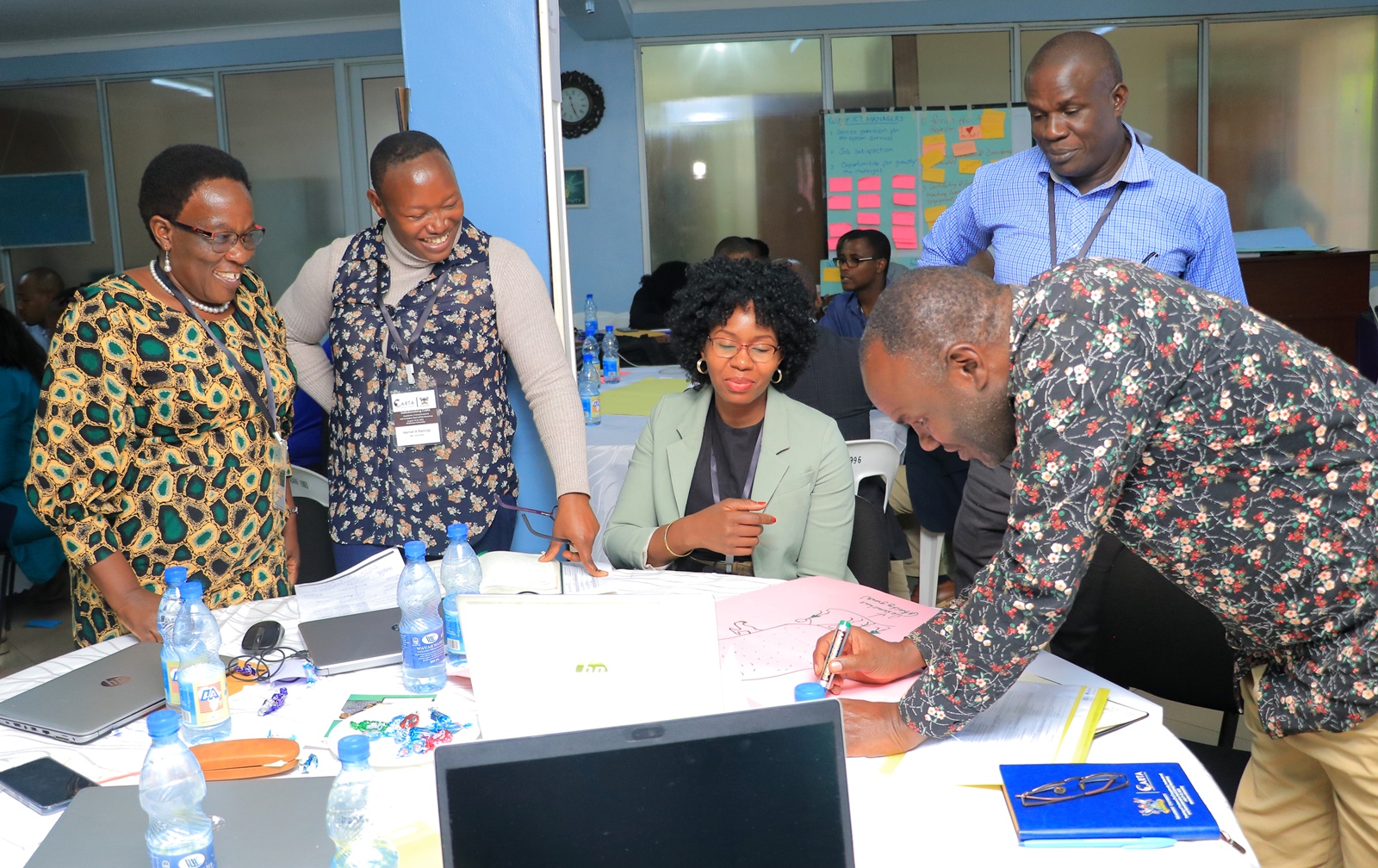
KAMPALA—Researchers in African Universities have been urged to cultivate a Responsive Culture, create, maintain, and strengthen collaborations, and uphold Research Ethics. In the CARTA programme, Participants explore the requirements for successful research in African universities, including researcher training based on global best practices. They also define and address knowledge management as the process of generating and sharing information; demonstrate the positive linkages between quality research and sustainable development in Africa.
These issues featured prominently at the CARTA’s APAS Workshop in Kampala, a week-long training for Academic, Professional, and Administration Staff (APAS) and Trainers of Trainers (ToTs). It is organized by Makerere University and the Consortium for Advanced Research Training in Africa (CARTA).
Dr. John Bosco Isunju, the CARTA Focal Person, and iCARTA Project lead at Makerere University, highlighted the Workshop’s Goal of fostering a responsive culture among Universities and Research Institutions Staff. By examining the efficiency of governance structures and processes that support research and graduate training in African Universities and Research Institutions. The CARTA programme seeks to create an environment conducive to the success of early-career and seasoned researchers.
Therefore, a total of 57 Participants and 14 Facilitators from across Africa are convening in Kampala to train on research systems, policies, and processes. The Participants are from Makerere University in Uganda; Moi University and University of Nairobi in Kenya; Obafemi Awolowo University and University of Ibadan, Nigeria; University of Rwanda, Rwanda; University of the Witwatersrand, South Africa; Kamuzu University of Health Sciences (KUHeS), Malawi. Further, Participants were drawn from Research Institutions including the African Population and Health Research Centre (APHRC), Kenya; Agincourt Health and Population Unit, South Africa; and Ifakara Health Institute, Tanzania.
The CARTA APAS Workshop was conducted in 3 days for all Participants; and an additional 2 days for the Training of Trainers (ToTs), from August 12th to 16th August 2024, at Makerere University, School of Public Health – ResilientAfrica Network (MakSPH-RAN), Plot 28, Upper Kololo Terrace, Kampala, Uganda. At the end of the training, Participants were awarded Certificates and urged to cascade the knowledge and skills acquired in their respective institutions.
At the opening session, Dr. Rhoda Wanyenze, a Professor and Dean of Makerere University School of Public Health (MakSPH), emphasized the importance of collaborations in research among African academics.
She noted that over the past five years, MakSPH has collaborated with partners across 25 African countries, indicating a vast network of research partnerships. Dr. Wanyenze also expressed hope that Participants will leave the training with new partnerships and networks, further emphasizing the goal of fostering collaboration among attendees.
“Partnership is very important and I hope as we are here, we will be networking so that at the end of the APAS training, as we leave we will maintain the partnerships and continue to forge networks with researchers we haven’t worked with before. That will hopefully be one of the outcomes of us working together during this APAS Training,” said Professor Wanyenze.
Over the years, Makerere University has enjoyed a long-standing partnership with APHRC. According to Dr. Wanyenze, there is a need to reduce bureaucratic bottlenecks that hinder productivity and collaboration in African Universities and Research Institutions needed to improve the university research ecosystem, with a key focus on students.
She further noted that; “Students are critical in the research ecosystem. They are smart; they have ideas, especially when we give them space and when they know that their views matter. We need to create an environment where students can communicate freely what they think works without feeling shy and thinking that you’re going to throw it back at them, and make them feel uncomfortable in our Universities.”
Dr. Anne Nangulu, a Professor of Economic History and Principal of Bomet University College (a Constituent College of Moi University) who is also the Focal Point for CARTA at Moi University, believes it is vital for university officials to be proactive and plan ahead of time to execute their academic and research related duties and responsibilities. Prof. Nangulu, re-echoed Prof. Wanyenze, encouraged faculty to delegate some of their duties to students; early career academic and administrative staff as part of mentorship especially at postgraduate level.
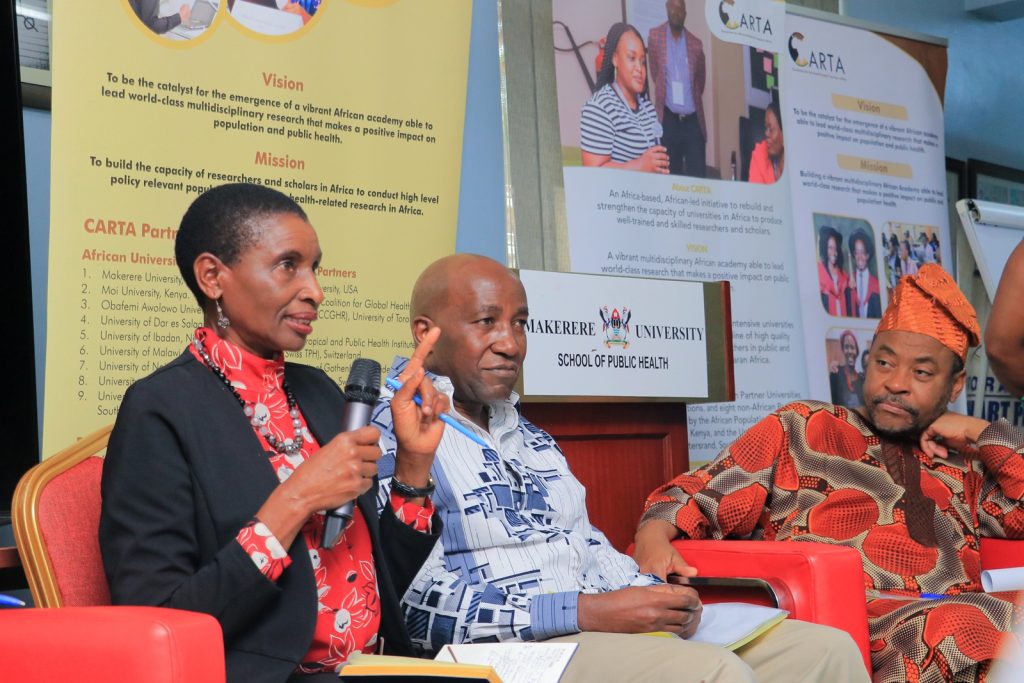
Prof. Nangulu further noted that; “We might be a little selfish when funds arrive in small amounts. You want to accomplish everything such as data collecting, analysis and dissemination. Think about collaborative research by incorporating early career staff as well. Also, please update your resume today, keep it online, and keep it current. It is part of leadership in promoting institutional and individual visibility in the global space.”
Dr. Joseph Gichuru Wang’ombe, a career development expert and Deputy Executive Director at APHRC, emphasized the need for greater participation in high-quality research and urged participants to actively develop research capacity.
“If you believe in something and put it into your mind and heart, it can be realized. The research and good quality research have to be done by more and more people, and that means that we are building capacity and enabling many others to do research.”
In addition, he stated that workshops emphasize the value of a supportive network of research administrators, clear distinctions between functionaries, the need for funding, mainly from African governments, and technology transfer for the continent.
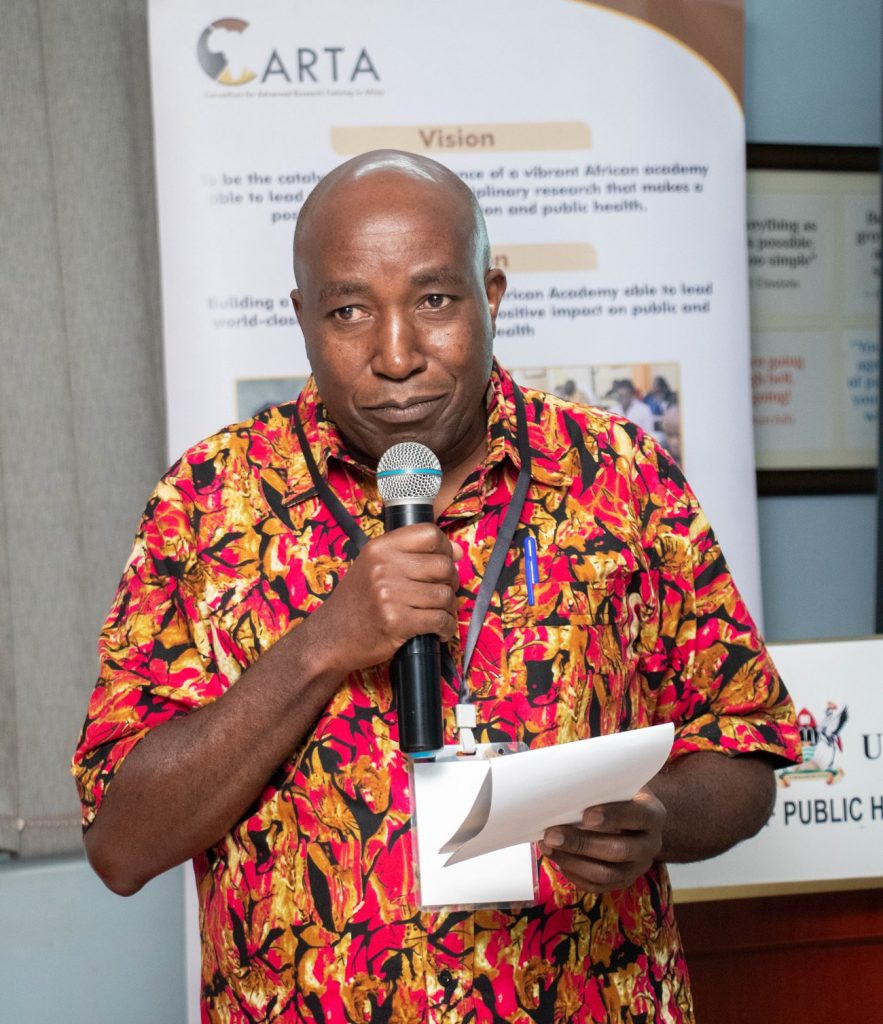
“To appreciate that it is more than simply the research; it is also about what happens in the library. It is what happens in the Registrar’s and bursar’s offices. We are very happy to see people from many sections of our universities come together. One of the most amazing things we have noticed with CARTA APAS programme is that personnel in Universities as well as research institutions can come from the same institution and not know each other. They meet for the first time but the silos are broken when they return, you’ll notice they’ve discovered new collaboration methods,” said Dr. Gichuru.
Dr. Akinyinka Omigbodun, a Professor of Obstetrics and Gynaecology at the University of Ibadan, believes that; Everyone in the university research ecosystem is essential and that institutions must try to use the multi-disciplinarity and expertise of their human resources to build better research environments.
He further emphasized that; “Let us all work as a group. If you observe soccer players, they are part of a team, but they also work in groups. You have the attackers, midfielders, and the defense. You will find that even defenders score goals. The attackers go back to defend when the team is under pressure. Thus, we all must learn to appreciate and do work as teams as well as groups; that way, we can achieve more in African Universities and Research Institutions.”
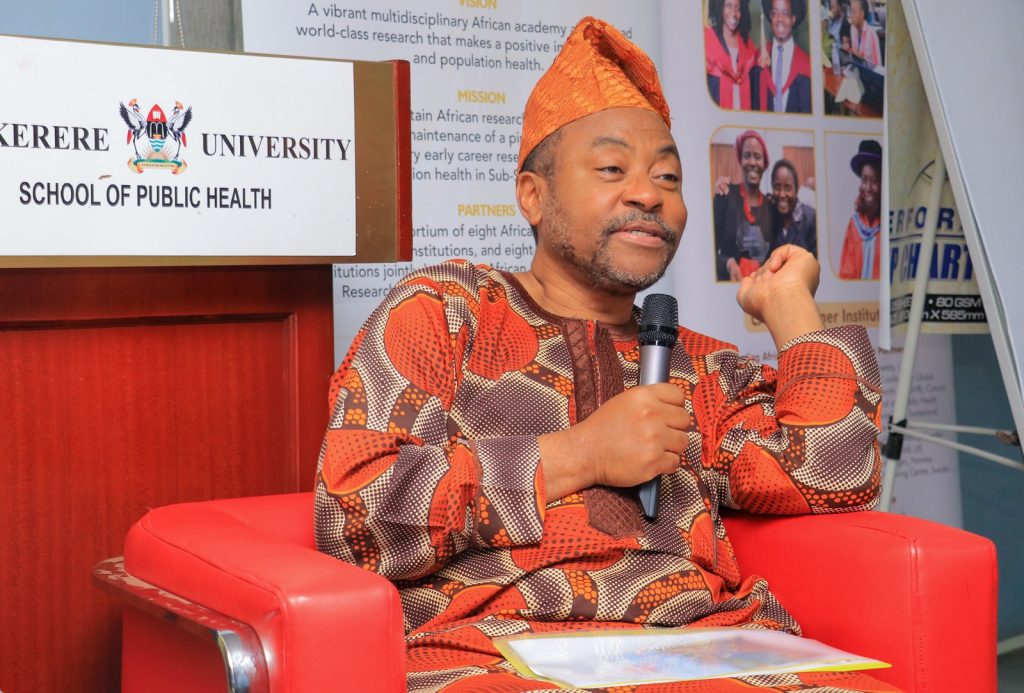
Started in 2007/2008, CARTA, a Consortium of eight African Partner Universities, four Research Institutions, and Eight non-African Partner Institutions has been led jointly by the African Population and Health Center, Kenya, and the University of the Witwatersrand, South Africa.
Every year, CARTA facilitates APAS Workshops to strengthen the capacity of institutional functionaries. The iCARTA Project at Makerere University (a NORHED II grant from NORAD), and the Global Science for Africa Foundation (SFA) through CARTA funded the Workshop. This programme seeks to inspire Participants to improve commitment to institutional systems and drive transformation to attain world-class research in African Universities and affiliated research institutions.
In sum, CARTA works as a collaborative arrangement to support sustainable development of a vibrant African Academy able to lead world-class multidisciplinary research that positively impacts public and population health.
You may like
-


Strengthening Grants Management Through Institutional Collaboration and Capacity Building
-
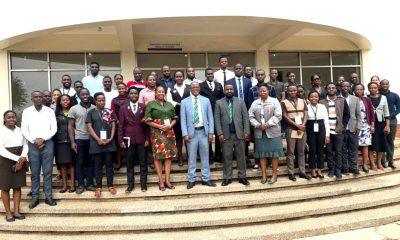

Mak Moves to Revitalize Food Technology & Business Incubation Centre to Drive Innovation & Entrepreneurship
-
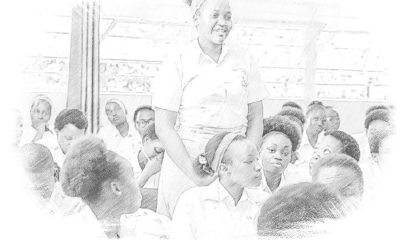

Ugandan Study Flags Girls and Senior Students as a Mental Health High-Risk Group
-
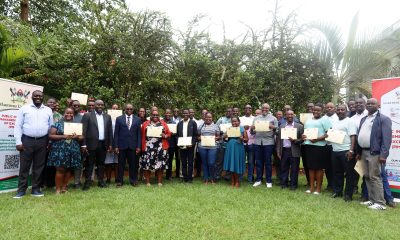

Makerere’s PIM Centre Concludes Training on Certificate of Financial Implications (CFI)
-


Call for Applications: Responsible Conduct of Research (RCR) Training Course
-
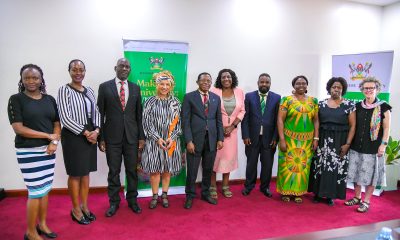

Mak, HERS-EA Discuss Nurturing More Women Leaders
General
Strengthening Grants Management Through Institutional Collaboration and Capacity Building
Published
1 day agoon
July 15, 2025
As the funding to the higher education sector keeps on reducing due to competing priorities, universities are implored to come up with structures and strategies to attract and win research grants.
Key findings indicate that universities with institutionalized grant management offices, strong and coordinated research teams are better positioned to effectively compete for grants.
Makerere University, in partnership with Northwestern University, is spearheading the E-SMAC G11 Grants Administration and Management workshop from 14th to 17th July 2025, aimed at strengthening grant management offices and systems among the participating universities and entities.
It is envisioned that through this capacity building approach, the workshop which brings onboard over 130 participants from different universities and entities, will address the knowledge and skills gaps among faculty, grant managers, administrators and support staff.
The participating universities and entities include: Makerere University, Uganda Christian University – Mukono, Soroti University, Gulu University, Clarke International University, King Ceasor University, Kyambogo University, Muni University, Mother Kevin University, Uganda Martyrs’ University-Nkozi, Ernest Cook University, Mbarara University of Science and Technology, University of Kisubi, Kabale University, Busitema University, BRAC University, Infectious Diseases Institute, Ministry of Health, and among others.

According to Prof. Sylvia Antonia Nakimera Nannyonga-Tamusuza, the Head of the Grants Administration and Management Support Unit (GAMSU) at Makerere University, the workshop provides a platform to: build faculty, grant managers and administrators capacity in grant writing and management, foster cross-functional collaboration across departments, strengthen understanding of budget creation, biosketch and funder systems, encourage mentorship and peer to peer learning, and lay a foundation for regular support.
The training tackles four broader themes namely Grants Introduction and Systems, Proposal Development, Capacity Building, and Outcomes and Forward Planning. It covers vital areas such as grant writing, budgeting, funder systems, compliance, and overall grant administration. It features practical sessions, mentorship opportunities, and collaborative learning, with the goal of strengthening pre-award and post-award grant management and improving research productivity and compliance.
The training workshop is part of the Expanded Strengthening of Makerere University’s Research Administration Capacity (E-SMAC) program, which focuses on enhancing research administrative systems and staff capacity at Makerere University and its partner institutions. The program being implemented from July 2024 to December 2025 is funded by the National Institute of Allergy and Infectious Diseases (NIAID).

Opening the workshop, the Acting Deputy Vice Chancellor (Finance and Administration) at Makerere University, Prof. Winston Tumps Ireeta urged universities to institutionalize grant management offices and policies as well as strengthening research systems through collaborations.
Sharing his experience, Prof. Ireeta informed the participants that he was involved in the strategic discussion that led to the establishment of GAMSU at Makerere University. “We observed that Makerere University School of Public Health had established a grants office, which was instrumental in attracting and winning funds for research. We were inspired by this best practice. Thus, a comprehensive policy was developed to streamline and strengthen grants management across all colleges at the University,” he said.
Prof. Ireeta noted that Makerere University commits to being a research-driven institution, a strategic direction, that needs a strong funding base. ‘Research grants are therefore a key resource,” he said.
Stressing the importance of adhering to the technical details in the grants management processes, Prof. Ireeta appealed to the participants to be active listeners and maximally utilize the moment to learn from the experienced facilitators.

In the same vein, Prof. Nannyonga-Tamusuza, applauded the University Council and Management for the strategic direction undertaken to elevate GAMSU from a Unit to a Directorate. This points to the central role of the grants office in the life cycle of Makerere University. She pointed out that GAMSU reports to the Vice Chancellor through the Deputy Vice Chancellor (Finance and Administration).
Established by the University Council in 2020, GAMSU is a central office at Makerere University. It provides professional and coordinated services across the entire grant life-cycle-from identifying funding and developing proposals to ensuring compliance, project execution, financial oversight, and institutional capacity building. GAMSU works closely with academic and administrative staff to support competitive, well-managed and accountable research.
Focusing on the training workshop, Prof. Nannyonga-Tamusuza called upon the participants to utilize the golden opportunity to deepen their understanding of grants management in advancing research. She acknowledged the role of this collaboration in fostering mutual learning and the sharing of best practices, noting that such initiatives were key in ensuring that research conducted by universities aligns with global standards. She encouraged participants to engage fully in the workshop, collaborate with their peers, and build lasting connections to foster continuous learning.
The Administrative Director of the Havey Institute for Global Health at Northwestern University, Ms. Kate Klein, noted that grants administration goes beyond securing funding. She explained that grant administration is about building strong, sustainable systems that support researchers, facilitate collaboration, and ultimately contribute to solving global challenges.

She urged participants to critically analyze their current systems and identify areas where improvements could be made. By doing so, they would be better positioned to manage grants effectively and maximize their impact.
“Collaborating and learning from one another is essential,” Ms. Klein stated. “When grants administration is effectively managed, it becomes a powerful catalyst for driving impactful change in research, ultimately advancing global initiatives that address the world’s most pressing challenges.”
Presenting the existing support systems and Principal Investigator (PI) agreements at Makerere University, Prof. Nannyonga-Tamusuza pointed out the critical role of GAMSU in maximizing Makerere University’s access to grants. This is particularly important in the context of limited financial resources, where GAMSU ensures that the university effectively leverages available funding opportunities.
Prof. Nannyonga-Tamusuza explained that GAMSU ensures research projects align with the priorities of funders and comply with both institutional and external regulations. She emphasized that this alignment is essential for securing and managing grants successfully. She stated that oversight offered by GAMSU, helps streamline the process for researchers. She pointed out that grant management is a collaborative process, involving multiple stakeholders across the university, which ensures that the necessary expertise and support are in place to manage grants effectively.
Underscoring the importance of grant negotiations, particularly with sub-award grants, Prof. Nannyonga-Tamusuza clarified that such negotiations are most successful when managed at the institutional level, where GAMSU oversees the entire lifecycle of a grant-from identifying funding opportunities to post-award activities.
Ms. Harriet Nambooze, the Project Coordinator at Makerere University School of Health Sciences, provided participants with a detailed guide on navigating the National Institutes of Health (NIH) grant application process. She introduced essential tools such as Grants.gov, Bureau Commons, and the National Council for Accreditation of Teacher Education (NCATE), which are critical for submitting NIH funding applications.

Ms. Nambooze stressed the importance of accurately setting up roles, including Principal Investigator (PI), Systems Administrator (SA), and Administrative Official (AO), as well as ensuring that profiles are up-to-date across various systems like e-recommends and login.gov.
She highlighted the necessity of adhering to NIH’s strict submission deadlines and maintaining efficient account management to facilitate timely applications. To avoid potential delays, Ms. Nambooze recommended that institutions should appoint multiple System Administrators, to increase the chances of successful grant submissions.
Presenting to the participants, Mr. Mordecai Tayebwa shared a detailed, step-by-step guide to starting a new grant application. He explained the key elements of the grant process, including the necessity of including a budget, adhering to specific formatting guidelines, and uploading required documents, such as the foreign justification for international projects.
He emphatically pointed out the need of thoroughly verifying the application before submission to ascertain that all required documents are included. This step is crucial to avoid errors that could delay or jeopardize the submission.

The first day of the workshop set a strong foundation for enhancing grant administration capacity among the participating universities. Participants were equipped with knowledge and skills in grant systems at the national and global levels.
Day two, will focus on topics such as reading funding opportunity announcements, tailoring writing, budget development and justification, sub-contract management, sub-recipient monitoring, and Memoranda of Understanding (MoUs).
On Day three, the participants will gain a deeper understanding of the Grants Office, financial management, internal controls and reporting, peer review process overview and project closeout.
On Day four, the participants will witness the launch of the MakGAP (Makerere University Grants Professional Initiative), listen to a keynote speech on grants management from the Vice Chancellor of Makerere University, Prof. Barnabas Nawangwe, as well as presentations on professional growth through MakGAP, CRA Exam, and Global Research Administration Networks, and professional recognition of research managers and administrators in Africa and post evaluation.
Health
Ugandan Study Flags Girls and Senior Students as a Mental Health High-Risk Group
Published
4 days agoon
July 12, 2025
Based on research led by Max Bobholz and colleagues from Makerere University in Uganda, Essentia Institute of Rural Health, and the Medical College of Wisconsin in the United States.
Adolescence is meant to be a time of holistic growth and self-discovery, but for many Ugandan teenagers, this period is becoming a season of silent mental health struggles. A new study published in PLOS Global Public Health has uncovered a silent but growing crisis: nearly one in five Ugandan secondary school students in the study areas have signs of an emotional disorder. These conditions included anxiety, depression, post-traumatic stress disorder (PTSD), and adjustment disorders often involving excessive worry, sadness, fear, or mood instability. Also, one in 20 adolescents exhibited behavioral issues ranging from attention-deficit/hyperactivity disorder (ADHD) and oppositional defiant disorder to substance use and other risky behaviors like alcohol use.
The study, led by Max Bobholz, a PhD candidate in Public and Community Health at the Medical College of Wisconsin, surveyed a sample of 1,953 students aged 10 to 18 years enrolled in eight secondary schools in Iganga district in Eastern Uganda and Mukono district in Central Uganda. This was one of the most comprehensive efforts yet to understand the prevalence and drivers of mental health challenges among school-going Ugandan adolescents.
“We are looking at a generation facing a complex blend of stressors, namely, academic, social, and emotional,” says Bobholz. “Our findings show that certain groups are especially vulnerable, and schools need to be equipped to respond.”

This study results, published on June 12, 2025 was funded by the Swedish International Development Cooperation Agency (SIDA), a government agency of the Swedish Ministry for Foreign Affairs, through the Makerere University Postdoctoral Fellowship to one of the investigators, Dr. Catherine Abbo. Other researchers included Julia Dickson-Gomez, Arthur Kiconco, Abdul R. Shour, Simon Kasasa, Laura D. Cassidy, and Ronald Anguzu.
According to the study, girls bear a higher emotional burden. Researchers found that female students had nearly two times higher odds of suffering from emotional disorders such as anxiety or depression than their male peers.
Dr. Catherine Abbo, an Adolescent Psychiatrist and Associate Professor at Makerere University, attributes this to both biological and socio-cultural factors. “Puberty brings hormonal shifts that can heighten emotional sensitivity,” she explains. “But just as importantly, Ugandan girls often face intense pressure to conform to gender roles while also navigating issues like body image, harassment, and future uncertainty.” The researchers are calling for gender-sensitive mental health interventions, particularly in schools, where early support could help mitigate long-term mental health issues.

Higher associations in older teens?
Age also emerged as a key associated factor, with each additional year increasing the odds of behavioral disorders by 20%. “As adolescents grow older, they are more prone to risk-taking, impulsivity, and resistance to authority,” explains Dr. Simon Kasasa, a senior lecturer and biostatistician at Makerere University School of Public Health.

“Combine that with academic pressure and identity-related stress, and it’s no surprise we’re seeing more conduct issues in late adolescence,” Dr. Ronald Anguzu, an Assistant Professor in the Institute for Health and Humanity at the Medical College of Wisconsin, added. This study raises critical questions about whether and how Ugandan secondary schools support older students as they transition toward adulthood.
The unseen influence of family mental health
The study also found that adolescents with a family history of mental illness had twice the odds of exhibiting behavioral problems compared to those without such a history.
“This speaks to the intersection of genetics and environment,” says Bobholz. “Living in a household with people affected by mental illness can mean instability, stigma, and lack of emotional support, all of which weigh heavily on a developing mind.”
The authors recommend that school mental health screening include family mental health history and advocate for greater collaboration between education and health sectors to support at-risk households.

Private schools: High marks, higher stress?
Interestingly, students in private schools had 1.4 times the odds of experiencing emotional disorders compared to those in public schools. Private schools, often seen as academic havens, may inadvertently be cultivating high-pressure environments. “There’s an assumption that better facilities mean better well-being,” says Dr. Abbo. “But intense academic competition, social isolation, and a lack of trained counselors can create emotional pressure cookers.”
Previous research in 47 secondary schools across five districts (Rakai, Kyotera, Masaka, Lwengo, and Kalungu) in southwestern Uganda found that economic and family support helped reduce absenteeism among adolescent girls in secondary schools. However, this support did not significantly improve behavior or reduce grade repetition. The region, which includes districts like Rakai and Masaka, also faces a higher burden of HIV, adding to the challenges young people experience.
Meanwhile, a review of data from 42 primary schools in Luwero District identified school-based mental health interventions such as cognitive behavioral therapy and mindset-building approaches as being particularly effective. Researchers now suggest that integrating these strategies, along with efforts to reduce school violence, could go a long way in improving the mental health of Ugandan adolescents.
A-Level pressure: Academic ambition meets mental health strain
The study also found a correlation between advanced (A’level) education and increased risk of emotional disorders. “We selected one school district from each region based on population and past academic performance. As these students prepare for university or the job market, the pressure to succeed becomes enormous,” says Kasasa. “They’re facing a future full of uncertainty, with very little structured mental health support to help them cope.”

A wake-up call for Uganda’s education and health systems
The authors of this study assert the urgent need for school-based mental health programs, especially in private and A-level institutions. These programs should offer routine screening, emotional support, and training for teachers to recognize warning signs of mental health disorders.
Importantly, this study adds weight to calls for a national adolescent mental health policy, tailored to Uganda’s context, with interventions that bridge health, education, and social services.
“Our data shows that mental health challenges are not a fringe issue,” says Bobholz. “They are widespread, significant, and deeply tied to school, home, and society.”
The COVID-19 school closures between 2020 and 2022 deepened feelings of isolation and financial strain, with out-of-school adolescents reporting depression rates as high as 21.5% to 50% higher than their peers who remained in class, according to research published in February 2025. Yet Uganda invests less than 1% of its health budget in mental health, with just one psychiatrist per million people, leaving many teens to cope through cheap alcohol used by 28% of urban youth or untrained healers, as reported by the government paper The New Vision in April 2025. With only 26% of students completing lower secondary school and 35% of the population under age 24, these mental health challenges now pose a serious threat to the country’s future.
Mercy Akankunda of Proven Foundation, a Ugandan NGO supporting vulnerable groups, warns that mental health struggles are quietly eroding the well-being of the country’s youth, over 12 million strong and making up 35% of the population. “These teens are not just statistics. They are the future of Uganda, she asserts. If Uganda hopes to reap the dividends of its young population, addressing adolescent mental health must become and remain a national priority, not just for treatment, but for prevention, resilience, and hope.
Reference:
Bobholz, M., Dickson-Gomez, J., Abbo, C., Kiconco, A., Shour, A.R., Kasasa, S., Cassidy, L.D., & Anguzu, R. (2025). Correlates of behavioral and emotional disorders among school-going adolescents in Uganda. PLOS Global Public Health. Read the study here
Health
Call for Applications: Responsible Conduct of Research (RCR) Training Course
Published
5 days agoon
July 11, 2025By
Mak Editor
The Responsible Conduct of Research (RCR) Training Course, scheduled to take place from July 30th to August 1st, 2025, at the Makerere University College of Health Sciences’ Conference Room.
Background
The SUSTAIN: Advancing Makerere University Masters of Health Sciences in Bioethics program at Makerere University College of Health Sciences aims at developing and institutionalizing a mentorship program in research ethics that facilitates development of bioethics professionals and health researchers who are committed to the growth and application of research ethics in Uganda’s academic and research institutions to the highest possible degree. The Responsible Conduct of Research (RCR) course is one of the short courses that introduces trainees to a framework that involves application of established scientific, professional norms and ethical principles in the performance of all activities related to scientific research.
Course objectives
At the end of this course, trainees should be able to identify, manage and prevent research misconduct.
Course outline
Introduction to RCR; Introduction to Professionalism and Ethics; Human subject’s protection and regulatory framework in Uganda; Humane handling of animal research subjects; Conflict of interest;
Responsible laboratory practices; Mentor-mentee relationships; Collaborative research international, industry); Peer review; Research misconduct (including policies for handling misconduct); Community involvement during research in a low resource setting; Responsibility to society and environment; Responsible financial management; Data acquisition, management, sharing and ownership; Responsible authorship, publication and communication.
Target group
The Responsible Conduct of Research course is targeted at Researchers, Research administrators, Research assistants, Study coordinators, Graduate students and Student supervisors. Certificates will only be awarded to participants with 80% attendance.
Course fee: 205,000/=, or 56USD is payable.
The course fee will cater for meals and refreshments during the training period.
Payment & Registration procedure:
9030026194023, Stanbic Bank, Mulago, Makerere University Biomedical Research Center Limited
Dollar Currency:
9030026194147, Stanbic Bank, Mulago, Makerere University Biomedical Research Center Limited
Please Note: Share payment details on email/whatsup and a hardcopy deposit slip delivered on the first day of the training to Miriam Musazi, Department of anatomy, Bioethics Centre, Room C4,
Mob: +256 782 363 996/ +256 701 363 996, Email: mmusazi@gmail.com.
NB. Only those who will have paid by this date will be considered for the course
Venue: The training will take place at Makerere University College of Health Sciences’ Conference room
Trending
-

 Education2 weeks ago
Education2 weeks agoAdmission List to Bachelor of Education External (BED) 2025/26 -Private Sponsorship
-

 General1 week ago
General1 week agoRe-advert: Admission to Undergraduate Programmes 2025/2026
-

 General1 week ago
General1 week agoRe-Advert for Applications for Diploma and Certificate Training
-
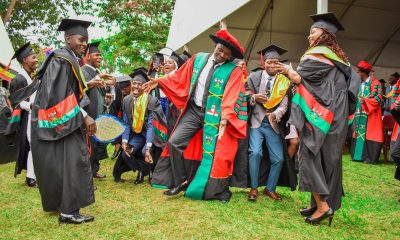
 General2 weeks ago
General2 weeks agoDiploma/Degree Holders Scheme – Self Sponsorship Admission Lists 2025/26
-
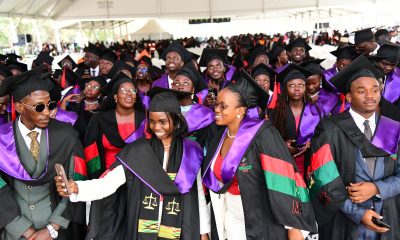
 General2 weeks ago
General2 weeks agoAdmission Lists for – Bachelor of Laws 2025-26
